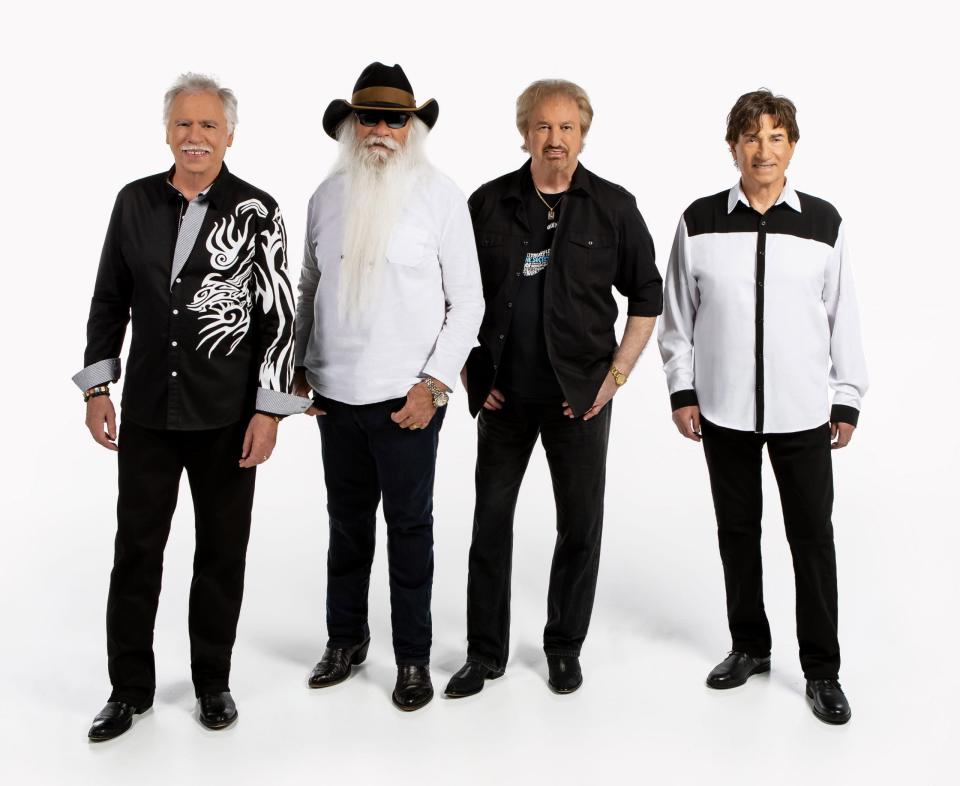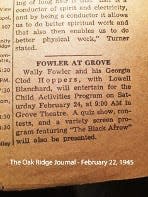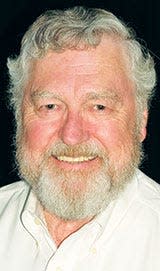Find out about The Oak Ridge Boys' ties to Oak Ridge
This is a reprint of the original "Historically Speaking" column on the history of how the Oak Ridge Boys got their name with added lyrics to "John Hendrix’s Vision." As two of the Oak Ridge Boys, William Golden and Richard Sterban, will be in Oak Ridge outside the Historic Grove Theater, at 3 p.m. Monday, Nov. 20, for the unveiling of the Tennessee Music Pathways marker, I thought it would be good to refresh readers on this history.
***

On Aug. 6, 1945, the world learned about Oak Ridge, Tennessee. People in Knoxville were obviously surprised to learn just exactly what was being done just across a few ridges from their town. Of course, most of the folks behind the gates at Oak Ridge learned the same amazing facts at the same time.
Some people were quicker than others to capitalize on the name “Oak Ridge.” One such individual was John Wallace "Wally" Fowler, born Feb, 15, 1917, and died June 3, 1994. Wally was singing in church at the age of six. As a teenager, he sang baritone in a gospel quartet in Rome, Georgia. He was also a member of the first gospel quartet to become members of the Grand Ole Opry – The John Daniel Quartet – again singing baritone. While he grew up in Georgia, at some point by the early 1940s he had moved to Knoxville.
In 1944, he gained recognition for songs he wrote such as, "Mommy Please Stay Home with Me,” recorded in 1944 by Eddy Arnold and "I'm Sending You Red Roses” also recorded in 1944 by Jimmy Wakeley. Also in 1944, Wally also formed a larger singing group, The Georgia Clodhoppers, who performed on Knoxville’s WNOX’s Mid-Day Merry Go Round. Wally and three members of this larger group sang in the Knoxville area as a gospel quartet known as the Harmony Quartet. A number of references indicate they sang in and around Oak Ridge, where the atomic bomb was developed. The Oak Ridge Boys’ official website http://theoakridgeboys.com states,
“The Oaks represent a tradition that extends back to 1943, before Hank Williams had a career. The original group, based in Knoxville, TN, began performing country and gospel music in nearby Oak Ridge where the atomic bomb was being developed. They called themselves the Oak Ridge Quartet, and they began regular Grand Ole Opry appearances in the fall of '45.”
I have now found actual documentation that Wally and his Harmony Quartet sang in Oak Ridge, as you will see below, in mid-1945, he was obviously close enough to Oak Ridge to realize the commercial value of that unique name that was on everyone’s lips and appearing in print media worldwide.
Just three weeks after the first atomic bomb was dropped on Japan, Wally renamed the Harmony Quartet the Oak Ridge Quartet with Lon “Deacon” Freeman, Curly Kinsey and Johnny New and played the Grand Ole Opry under that new and exciting name – the Oak Ridge Quartet.
In the Sept. 6, 1945, Oak Ridge Journal there was an article stating: “Grand Ole Opry” Coming Here Sunday Afternoon – The WSM Grand Ole Opry will appear in Oak Ridge on Sunday, September 9, (1945) giving two performances in the High School auditorium. Doors will open at 12:00 noon for the shows, which will begin at 1:00 and 3:00 PM. Admission will be $1.20. The nationally-known Barn Dance show will feature such characters as Curley Fox, the world champion fiddler; Texas Ruby, the original yodeling cowgirl; Uncle Dave Macon, the Dixie Dewdrop; Icabod, Satchel Britches and the Fox Hunters, along with many other stars. The performance is sponsored by the Recreation and Welfare Association.”
In the Thursday, Sept. 13, 1945 edition of the Oak Ridge Journal there was an advertisement that read: “Big Hillbilly Jamboree, Oak Ridge High School, Sunday, 1:30, September 16 - in person from WSM Grand Ole Opry, Wally Fowler and his Georgia Clodhoppers.” By this time the quartet made up of four of the members of the Georgia Clodhoppers were known as the Oak Ridge Quartet!
In Oct. 24, 1946, the following item was included in the Oak Ridge Journal’s Oak Leaves section, “LATEST RELEASE from the Hollywood office of Capitol records says Wally Fowler and his Oak Ridge Quartet have made a recording…”On the Jericho Road” and “Dese Bones A’Gwinna Rise Again” are the numbers. … We know Wally Fowler has written a folk song based on the story of the Hendrix prophecy on Oak Ridge. But does anyone know the origin of the Oak Ridge quartet?...”
Seems the question regarding the “origin of the ‘Oak Ridge Quartet’” is not a new question at all. In 1946 folks from Oak Ridge were wondering, yet the quartet had performed in Oak Ridge in September the previous year. Well, I hope this column is going to answer the question for all regarding how the Oak Ridge Boys/Oak Ridge Quartet got their name – thanks to Wally Fowler.
And, would I ever love to find the lyrics to the “folk song based on the story of the Hendrix prophecy on Oak Ridge” mentioned in the above Oak Ridge Journal article! Think I will ask the Oak Ridge Boys about that when they come to Oak Ridge this summer to perform in the Secret City Festival on June 16, 2007! They will likely be as surprised as you are that Wally ever wrote such a song. (Since I wrote this article, I have not only found the words to the song Wally Fowler wrote in 1946, “John Hendrix’s Vision.”
Wally’s three singers soon left the Oak Ridge Quartet and others who had sung with him, including Neal Matthews Jr., of Jordannaires fame a bit later, also moved on to other groups. He hired the Calvery Quartet to join the Oak Ridge Quartet and they played the Grand Ole Opry regularly and toured using the by then famous name for a number of years.
In 1957, Wally sold the rights to the group’s name to Smitty Gatlin, a member of the group, to cover a debt. More changes in personnel continued and sometime in or after 1962 the singing group’s name was changed from the Oak Ridge Quartet to The Oak Ridge Boys. According to one reference, this change was made by their producer, Bud Praeger, in an attempt to reflect their new contemporary sound.
However, another source gave credit to Smitty Gatlin for making the name change in 1961. They were no longer limiting their singing to gospel and the name change seemed intended to get away from the “quartet” terminology. Wally Fowler attempted to form another Oak Ridge Quartet, but was prevented from using that name by Gatlin and the other Oak Ridge Boys. The “Oak Ridge” name was seen as having significant value and was already becoming well known in music circles.
In January 1965, Bill (William Lee) Golden joined the group singing baritone. Although he was dropped from the group for a time, he is the present member of the group who joined at the earliest date. In 1966, Duane Allen, lead singer, replaced Smitty Gatlin who became a minister of music and stopped singing with the group. Richard Sterban, who sings bass, joined the group in 1972. Can’t you just hear him singing his trademark "oom-pop-a-mow-mow" bass tag line in “Elvira?” The last of the present group to join the group was Joe Bonsall, the tenor singer, who joined the group in 1973.
Their popularity began to grow when they joined with singers like Johnny Cash, The Carter Family and Roy Clark to record and to tour with them. Roy Clark’s manager encouraged them to focus more on country music rather than gospel. While they retained some of the gospel flavor, this transition worked well for them for a while, but the mix of country and gospel - without a clear single genre identity – resulted in a drop in sales of their music for a time.
However, in 1977 “Y’all Come Back Saloon,” “You’re the One,” “I’ll Be True to You,” “Cryin’ Again,” “Come On In” and “Trying to Love Two Women” in 1980 had them well on their way to the top. Then the song that made the group a runaway hit with a wide range of audiences, “Elvira,” was a cross-over hit that won a Grammy Award for them. In addition to its No. 1 standing on the country charts, it also made the Top Five on the pop charts. The album containing “Elvira,” named “Fancy Free,” was their first album to top the country charts and ultimately became their best-selling album. Other songs that did well for them were, “Bobbie Sue,” “American Made,” “Love Song,” “Everyday,” “I Guess It Never Hurts to Hurt Sometimes,” “Little Things,” “Make My Life with You,” and “Touch a Hand, Make a Friend.”
They continued to have top hits through the early and mid 1980s. However, in the late 1980s their appeal was slipping. In an attempt to reassure the public of their clean cut image, in 1987, they fired Golden whose rugged appearance and lifestyle was not seen as compatible with their desired image. The hits continued but at a slower pace and with reduced impact. Among the songs recorded in the late 1980s and early 1990s were, “It Take a Little Rain,” “This Crazy Love,” “Gonna Take a Lot of River” and “No Matter How High.” Ultimately the streak of top hits consisted of 16 No. 1 hits and 29 hits in the Top 10.
Golden sued the group, and they settled out of court. Not only did they settle their dispute, he was brought back into the group in a surprise appearance during their 1995 New Year's Eve show. Golden remains the most dramatic symbol of the group with his long flowing silver hair and beard. His appearance has now become a mainstay of the group’s image.
Steve Sanders, who replaced Golden during his absence from the group and who was a guitar player in the backup band, shot and killed himself in 1998. Noel Fox, one-time bass singer with the group, who went on to run the group’s publishing operations died in April 2003.
The Oak Ridge Boys have performed regularly in Branson, Missouri at the Grand Palace. They are scheduled to appear there 20 times in 2007.
Interestingly enough, Wally Fowler also wound up in Branson in the early 1980s. He formed a group known as Wally Fowler's Tennessee Valley Boys until they changed their name to the Branson Brothers. They were the resident band at Silver Dollar City in Branson for a number of years.
So, Wally Fowler sang under a wide variety of group names during his career. I doubt that he ever had another brainstorm as good as the one he had in August of 1945 when he saw the potential to capitalize on a name that was immediately recognizable world-wide - Oak Ridge.
I think he acted wisely by jumping on the chance to change the name of his “Harmony Quartet” to “Oak Ridge Quartet.” The quartet was a small set of his larger “Wally Fowler and the Georgia Clodhoppers” that performed in Oak Ridge on Sept. 16, 1945 at the Oak Ridge High School.
Information for this history of the Oak Ridge Boys came from their website, www.oakridgeboys.com, as did the photograph including Lon “Deacon” Freeman, original member of the Oak Ridge Quartet, singing with the Oak Ridge Boys. Other websites I used were, www.cmt.com biography pages, and wikipedia.

However, the most helpful source and by far the most fun research was done using Dave Miller’s archive of early Oak Ridge Journals when Bill Wilcox and I perused those old volumes reverently last Sunday afternoon. I hope you have enjoyed learning about the ties the Oak Ridge Boys have to Oak Ridge, as much as I have enjoyed writing about them!
The Oak Ridge Boys were a featured group in Oak Ridge’s 2007 Secret City Festival. They played Saturday night, June 16, 2007.

***
I hope you have enjoyed this review of the history associated with the Oak Ridge Boys and their connection to our city of Oak Ridge.
"John Hendrix's Vision"
Wally Fowler changed the name of his Harmony Quartet to the Oak Ridge Quartet to take advantage of the recent release of information about Oak Ridge when he was invited to play on the Grand Ole Opry in Nashville. He sang the following song on Ernest Tubb’s Radio Show "The Checkerboard Jamboree" in Nashville on Sept. 23, 1946.
Here are the words to his song about John Hendrix:
"John Hendrix’s Vision"
By Wally Fowler, 1946
Many, many years ago lived a prophet we now know
And his name was John Hendrix we are told
In the valley of Tennessee, he did tell his prophecy
To be laughed and scoffed at by his neighbors bold
Chorus: John Hendrix’s vision foretold a city
That would be built to help win a war and called Oak Ridge
And now he’s given atomic power
And its grown ever since they built Clinch River bridge
God told John Hendrix ‘fore he died
Of the things he’d prophesied
After he’d slept for 40 nights head on the ground
Just like in the days of old when old Noah was foretold
Of a great flood that would cover the world around
Chorus: John Hendrix’s vision foretold a city
That would be built to help win a war and called Oak Ridge
And now he’s given atomic power
And its grown ever since they built Clinch River bridge
Let us keep our faith in God while this sinful world we trod
And beware of this atomic energy
Like John Hendrix we must pray unto God each night and day
Then our mission going to grow in every way
Chorus: John Hendrix’s vision foretold a city
That would be built to help win a war and called Oak Ridge
And now he’s given atomic power
And its grown ever since they built Clinch River bridge
D. Ray Smith is the city of Oak Ridge historian. His "Historically Speaking" columns appear weekly in The Oak Ridger.

This article originally appeared on Oakridger: Find out about The Oak Ridge Boys' ties to Oak Ridge

